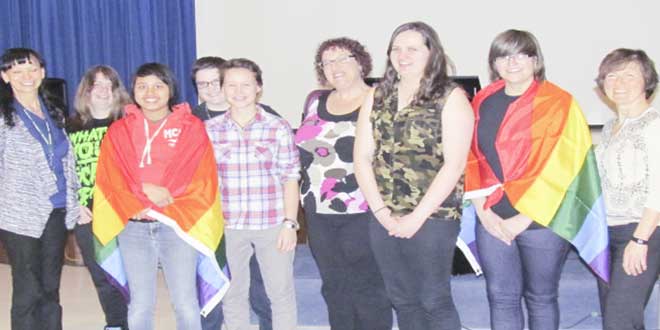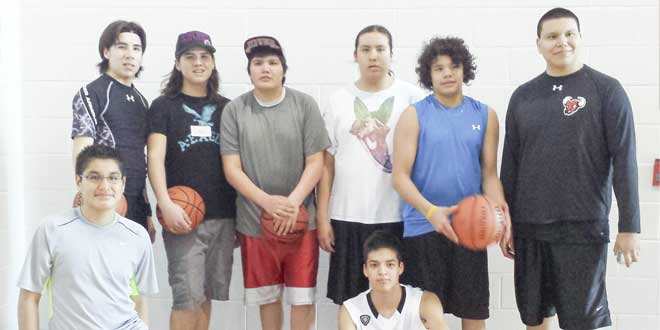M’CHIGEENG—The Manitoulin Secondary School (MSS) Parent Council hosted an information session at the high school in M’Chigeeng recently. Titled ‘Bridges to Inclusiveness,’ the event included a feast with local cuisine and speeches on ways to reduce barriers and promote inclusion for students. Four guest speakers talked about relevant topics including autism, aboriginal perspectives, mental health challenges and sexual orientation.
“We are truly proud to host this presentation for our students and community members,” said Laurie Zahnow, principal of MSS. “This is a time,” she continued, “when students are trying to figure out who they are. During this period of growth, it is imperative that they become aware of supports that are available to help guide them along the way.”
The students, parents and community members were welcomed to the MSS Equity and Inclusiveness Feast by Valerie Beaudin, School Council chairperson. “An evening like this opens the door for great conversations with our teenagers,” Ms. Beaudin said, adding that students may be questioning their sexual orientation and/or their gender identity or may be simply curious about lesbian, gay, bisexual, transgender/two-spirited (LGBT/two-spirited) issues and they may be uncomfortable talking about these topics. “Developing an environment that is inclusive and diverse is reflective of how a student sees themselves as part of this larger world rather instead of seemingly left out of it.” As the guest speakers delivered their talks, those in attendance feasted on foodstuffs prepared by Tammy Albers, a School Council member. “I miss one meeting,” said Ms Albers, “Just one meeting and they decide to put me in charge of the feast!” Ms. Albers certainly had a lot to work with as foods were donated by Island companies as well as parents and cooking classes and Ms. Albers herself made and decorated an amazing cake.
The first guest speaker was Terri Elgie, who has worked with autistic children for over 10 years.
“An important thing I learned,” Ms. Elgie told her audience, “was that we are never to refer to a child as autistic. They have the same wants and needs as all of us.” Ms. Elgie also learned some fascinating matters about these children including the facts that four boys have this condition for every one girl and children with autism seldom lie, cheat or pass judgment on others and that very little is known of autism by the general public. “I’ve worked with kids that have blown me away with their work on computers and iPads,” Ms. Elgie said as she went on to explain some of the barriers that these children face. These impediments include communication and may prevent the child from saying, “I am hungry, I need a glass of juice or I feel sick.” In these circumstances, the children learn sign language, communicate by picture exchange or use iPads. There are also sensory issues for these children as they cannot filter out smells that the rest of us can and can hear sounds long before they are audible to our ears.
Ms. Elgie finished her talk by asking, “What can we do as people, towns and communities to raise awareness about autism?”
The next speaker was Debbie King, an aboriginal support worker at MSS who explained that inclusion means that a school evolves to meet the changing needs of its members and that success in schools for aboriginal, Inuit and Métis students will come about through family influence and healthy relationships with teachers as well as peer support. Ms. King quoted several statistics from 2006 which showed that First Nation unemployment on reserves was 25 percent and that over 40 percent of First Nation people ages 20 to 24 do not have a high school degree, but that these kids are more likely to graduate if the schools are inclusive.
Next, the Rainbow Rights (RR) group brought song and laughter to the MSS cafeteria. “We are Rainbow Rights and we just want to have fun,” the group sang as they took their turn and explained that their organization is a MSS gay-straight alliance. The RR members had the students fill out a questionnaire regarding their sexuality in which anonymity was respected and students talked of depression, drug use, suicide and unprotected sex. Those answering the questionnaire also talked about the positive response they received from their parents when they came out. The group finished with the song ‘Everyone is Gay.’
Alison Orford, a mental health clinician, was the next speaker and explained that the work she does is free and voluntary for those from babies to 18-year-olds and includes intervention with parents to get a child or youth they help they need. She explained that there are a number of mental health issues that are usually seen in adults but now are seen in teens including anxiety, depression, eating disorders, ADHD, and borderline personality disorders. “Early intervention is the key,” explained Ms. Orford, “and is suggested when changes persist and interfere with function.” In answering the question ‘what can parents do,’ Ms. Orford suggested that parents listen more and lecture less, play with their children, establish boundaries, use disciplines more than punishment and be a positive role model.
The Bridges to Inclusiveness event ended as Ms. Albers thanked each of the speakers individually and said, “I am just a little overwhelmed tonight,” and “Rainbow Rights, you rock my world.”




